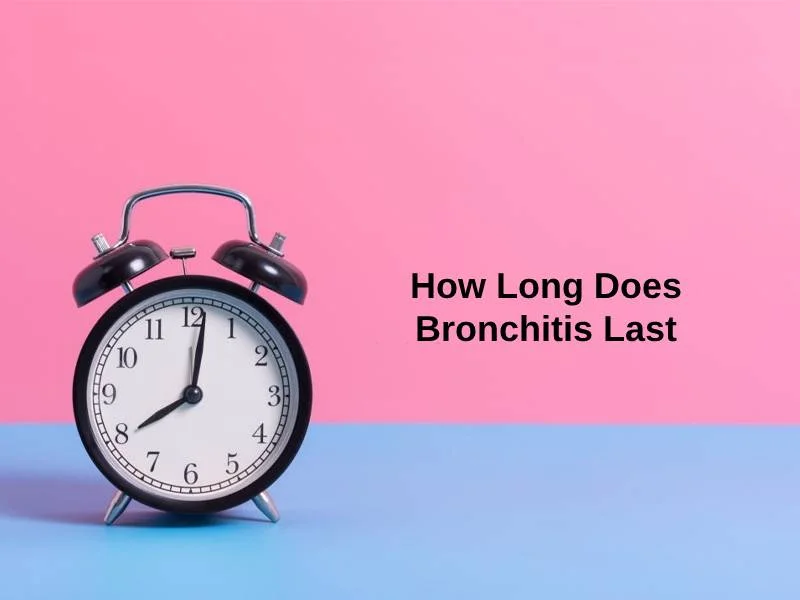Exact Answer: 2 weeks
Many conditions can seem light, but they can get severe when left untreated. Every medical illness is a certain part of the body, while some just affect the whole body. Among many illnesses, bronchitis affects the lungs. Bronchitis creates inflammation in the lungs, and it can also be called a chest cold. The effect of the illness can be sometimes severe and it can make a person miserable.
Bronchitis can be acute or chronic, and some symptoms are common in both types. Bronchitis does have some home remedies but many people always choose normal checks and cures that are prescribed by doctors. Various symptoms confirm when somebody has bronchitis and there are various reasons why bronchitis is caused.
Bronchitis normally lasts for about 10 to 14 days and it can be major or minor.

How Long Does Bronchitis Last?
| Stages | Time |
| Acute Bronchitis | 2 to 3 weeks |
| Phlegmy cough | 3 months |
| Episodic bouts of bronchitis | 2 years or more |
Bronchitis causes swelling and inflammation of the bronchi tubes. The bronchi tubes are the airways to the lungs and this condition can affect adults and children as well. The condition can be acute or chronic and the time taken to recover is based on whether the person is affected by acute bronchitis or chronic bronchitis. Normally, acute bronchitis can last for a week or two and chronic bronchitis certainly lasts longer than that.
Chronic bronchitis can last for about three months and the symptoms can sometimes last through the year. After considering many facts, The American Lung Association has decided the symptoms, causes, and remedies for bronchitis. There are some differences in the symptoms between acute and chronic bronchitis, but they both have inflammation as their primary symptom. Acute bronchitis normally occurs due to viral infections, but bacteria can also be the cause in about 10% of the cases.
First, an infection like a cold or cough makes its way up to the airway, and then it travels to the bronchial tubes. This condition is temporary and along with the active condition, the symptoms last about 2 weeks. Acute bronchitis never causes permanent breathing problems, but to those with respiratory diseases, there will be an increased risk. People with weakened immunity systems are also very much prone to this.
Why Does Bronchitis Last That Long?
Unlike acute bronchitis, chronic bronchitis lasts longer and this type of bronchitis does not go away. The severity of symptoms does not last the same way forever. Chronic bronchitis is a form of COPD (Chronic Obstructive Pulmonary Disease). Doctors classify bronchitis as chronic when they find the person is coughing with mucus for at least 3 months every year for 2 years.
The main cause of any type of bronchitis is smoking cigarettes. Smoking can damage the airways and it can also cause excess production of mucus in the lungs and also in the airways. This can also obstruct airways. When chronic bronchitis is left untreated for long, it can decrease the function in the lungs, which can lead to permanent damage.
Some of the symptoms include sore chest from coughing, fatigue, cough that produces mucus, congestion, tightness in the chest, wheezing. Acute bronchitis symptoms appear all of a sudden, but the symptoms of chronic bronchitis start developing gradually, and as time passes, the symptoms can get worse if left untreated. Some symptoms occur in specific types. For example, a low-grade fever can be found in acute bronchitis, and recurring respiratory infections, breath shortness can occur in people with chronic bronchitis.
Conclusion
Though chronic bronchitis is commonly found in adults, acute bronchitis can be found both in adults and children. The symptoms of acute bronchitis are similar in both children and adults, but children also have symptoms like gagging, coughing, and runny nose. A person must immediately visit the doctor if they experience wheezing, coughing which brings up mucus with blood, a fever of 101 degrees or higher, recurring episodic bouts of bronchitis, and especially when the symptoms don’t get cleared up for more than 3 weeks.
The patient must seek immediate assistance if they experience severe and extreme symptoms like severe shortness of breath and breathing trouble, along with blue pigmentation in the skin and nails.